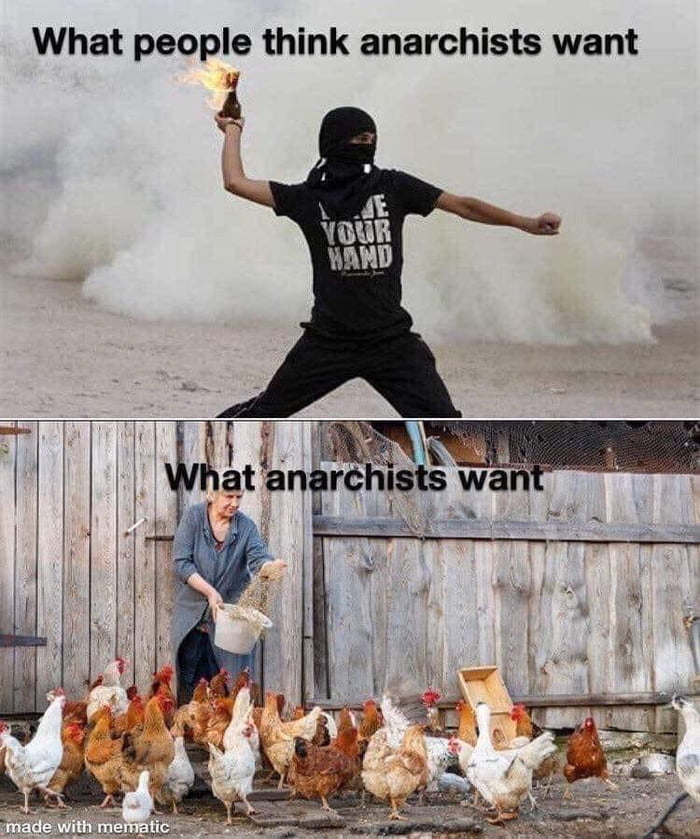Anarchy, Definitions, and Parallels to Continuous Delivery
We’ve talked about Anarchy before, in part how it’s an incomplete “plan” for a political system. Twitter is sort of a hub of conversation regarding Anarchism and Libertarianism, and there have been some increasingly interesting arguments there lately, with people making some of those same points and arguing about what Anarchists actually want as an ideal state.
You can see one example in this thread:
https://twitter.com/Wesley_Gest/status/1386402544591724547?s=20
The argument can mostly be summarized like this:

The general perception of Anarchists is that they want cities to burn, that they just want to do damage for the sake of doing damage. Anarchists say, over and over, “no, will you just listen” but a lot of people seem to be terrified of a lack of control. And when Anarchists show up and say they don’t want to be controlled and they don’t think that control is the right answer, it’s massively triggering for those people. When people are terrified, they don’t really listen so good…

We thought this was great, and important, (and Ace is really good with words in general), but…incomplete. It covers the interaction pieces, or what it looks like to behave as an Anarchist, but we think it’s important to talk about the fact that it starts with accepting something about yourself, and what that acceptance means for the world around you.
Anarchism, to us, is a consistency of feeling and related action:
- You do not agree that you yourself need to be controlled, and/or you do not accept others’ control of you.
- You have no desire to control others, finding that repugnant and morally wrong. As such, you do not use any kind of coercion (including manipulation) to dominate others to your will.
- You resist and speak out against systems of control applied to people by other people.
That’s…it. No fire-throwing, no building-looting, no Molotov-cocktail wielding manifestos. Anarchism is, instead, the confluence of “I don’t deserve to be controlled” and the Golden Rule.
Anarchism is the confluence of “I don’t deserve to be controlled” and the Golden Rule.
We think people who want to steal and burn and smash just like to hide behind “Anarchy” instead of admitting that they are hateful, or really angry, and want to break stuff. Which we get, really, but could you process your feels before acting please?

If there was no government law against rioting, would you go out and burn down your neighbor’s buildings and businesses? If there were no government laws against doing heroin, would you go out and do heroin? No? Neither would we. Anarchists are mostly against the government’s tremendously violent history, and we just want to make moral laws consistent with state laws: states shouldn’t have the power to harm, jail, and murder people “legally”. We find that to be immoral. Unfortunately, a sober viewing of history shows that that is what all states do.
This is why we are Anarchists.
Continuous Delivery
We talked about how Libertarianism has a lot of overlap, conceptually, with DevOps (link). While talking about this post, we made an additional connection between Anarchism and Continuous Delivery.
One of the things we discuss in our talks is that Continuous Delivery can just…happen when you get enough barriers, bumps, and blockades out of the way of software delivery. Basically, if you remove enough pain points and things in the way, continuous delivery will just happen because developers want to write code/solve problems/deliver on technical business objectives.
Comparatively, to Anarchist good – focus on the fact that someone controlling you is fundamentally wrong, and…if you’re consistent there, you will treat others the same way.
If you focus on the fact that someone controlling you is fundamentally wrong, and you behave consistently with that conclusion, you will treat others the same way.
Remove control and fear about software delivery -> Continuous Delivery.
Remove control and fear in personal interactions -> Anarchy.

God Words, and Love
We’ll leave you with this, that Josh posted:
Love is opposed to controlling people against their will. Love, then, is anarchy.https://t.co/HONr4JXxG6
— Joshua Smith (@architect_josh) April 26, 2021